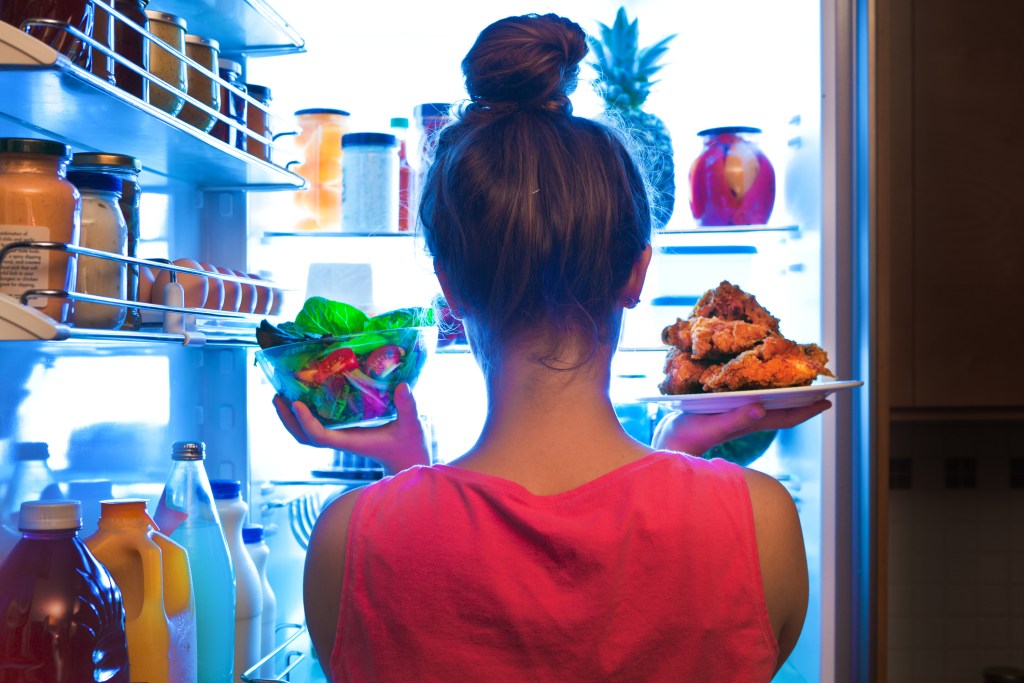In physiology analysis, the time period “placebo effect” refers back to the optimistic results that outcome from our notion of one thing being wholesome. For instance, train advantages our well being, however simply figuring out train is nice for us can also improve its advantages.
There’s additionally a phenomenon generally known as the “nocebo effect”—unfavourable results that occur once we count on one thing to be dangerous. The nocebo impact could also be related in terms of what we eat and the way it impacts our physique. Research have proven that eating foods high in fat and sugar can impair our blood vessel function. Whereas this could be due to the fats and sugar, it’s additionally potential that simply pondering a meal is unhealthy may cause hurt.
Consuming meals deemed to be “unhealthy”—by us or society—may cause physiological stress and disgrace. It’s potential that these feelings, together with the perceived unhealthiness of the meals we’re consuming, contribute to decreased coronary heart well being. A study published in the Journal of Applied Physiology checked out this speculation.
A gaggle of younger girls participated within the research, all of whom stated they have been susceptible to meals stress and disgrace, which maybe made them extra inclined to nocebo results associated to meals.
On one event, the ladies drank a milkshake that contained 540 energy, 14 grams of fats, 80 grams of sugar and 20 grams of protein. They got accurateinformation concerning the dietary content material of the shake. In different phrases, the individuals drank an unhealthy milkshake that they have been advised was unhealthy.
On one other day, the ladies drank the identical milkshake, however with a catch—they got inaccurate info on the shake’s dietary content material. They have been advised the shake contained 100 energy, 4 grams of fats, 3 grams of sugar and 10 grams of protein. In different phrases, the individuals drank an unhealthy shake that they thought was a wholesome nutrishake.
When requested concerning the drinks, the volunteers stated they thought the milkshake was extra dangerous and fewer wholesome than the nutrishake. Curiously, in addition they perceived the nutrishake as being extra dangerous and fewer wholesome than in a management situation after they drank plain water.
Endothelial perform, a marker of blood vessel well being, was impaired after consuming the unhealthy milkshake in comparison with when the individuals drank water. However endothelial perform didn’t worsen when individuals drank the nutrishake, although they have been consuming the identical fat- and sugar-laden milkshake!
What explains this obvious nocebo impact? It wasn’t associated to emphasize or disgrace—these rankings have been related when the volunteers drank the milkshake and the nutrishake. It wasn’t physiological stress both, as cortisol (a stress hormone) and inflammation ranges didn’t change after both beverage consumption. Finally, perceiving a beverage as unhealthy and dangerous appeared to have an effect on the ladies’s endothelial perform, however scientists haven’t but discovered why.
Do these findings give us the freedom to eat no matter we wish with out consequence? Does a burger and fries immediately turn into a part of a nutritious diet simply because we predict (or inform ourselves) it’s good for us? Most likely not, however there’s little question that how we understand what we eat—and our train and different life-style habits—influences our physiology. Let’s embrace the nourishing facets of our meals and go straightforward on ourselves once we eat one thing that society doesn’t deem to be “wholesome.” Stressing out about it or feeling disgrace may do extra hurt than good.

Brady Holmer, MS, obtained his grasp’s diploma in human efficiency from the College of Florida. He’s presently a researcher at Study.com and writes about science, well being and physiology on Substack.
Uncover extra from I Spy Physiology Weblog
Subscribe to get the newest posts despatched to your e-mail.
